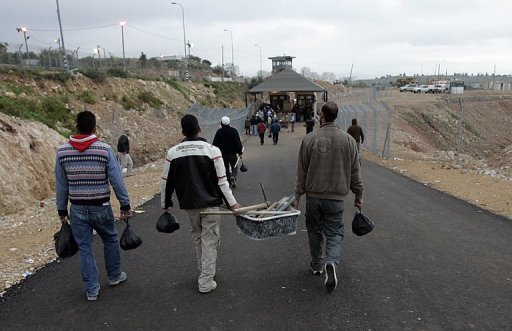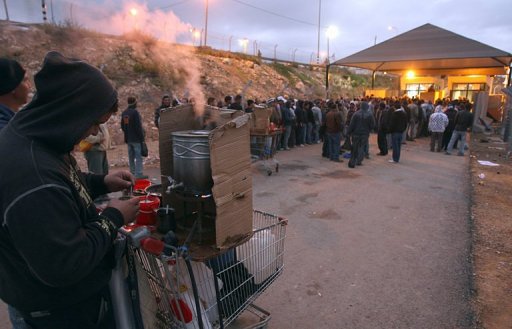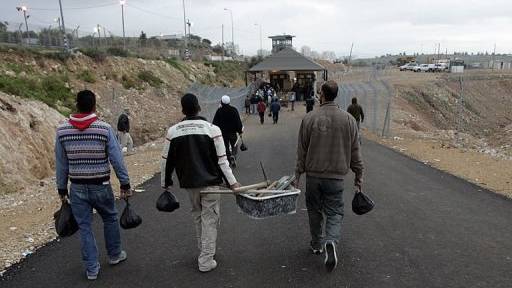Palestinians turn to jobs building settlements they despise
Source: google.com
Like most Palestinians, Ismail Harb resents the Israeli settlements that crown the hilltops of the occupied West Bank, but every day he lines up before dawn to help build them."It's not just the money we make in the Israeli construction projects, but also that the work in the settlements never stops," the 36-year-old says as he waits with hundreds of others in the chilly darkness before sunrise.
The workers gather outside a military checkpoint starting at 3:00 am to enter Israel or one of four nearby settlements, where most of them will help build new Israeli homes in the occupied territory.

Palestinian workers arrive at dawn at Nilin checkpoint.

Palestinian workers line up at dawn at the Nilin Israeli checkpoint.
Western-backed Palestinian president Mahmud Abbas has called the settlements the biggest obstacle to peace and refused to restart negotiations with Israel without a complete construction freeze.
But thousands of Palestinian labourers rely on work in the settlements, which pays more than twice the wages of similar jobs elsewhere in the West Bank, where the economy is still recovering from a violent uprising.
"If we could find the same kind of work in Palestinian shops then we wouldn't come here every day and face this humiliation before we even get to work," Harb says, referring to the long wait at the checkpoint.
"I completely agree with the Palestinian Authority's demand to halt the settlements, but where is the alternative that will provide us with a decent living," he asks.
They stand in line as the sun rises over the imposing white apartment blocks of the Modiin Ilit settlement on the other side. An Israeli soldier yells at the men in Hebrew, saying no one arriving after 6:30 am will be allowed in.
"I think most of the workers here know they are being humiliated, but there is no alternative," says Raid al-Rabi, 26, who works as a carpenter in the nearby Hashmonim settlement.
"People criticised the Palestinians who worked on the separation wall, but they had nothing to say when the workers asked them what the alternative was," he adds, referring to Israel's controversial West Bank barrier.
Nearly a half million Israelis live in more than 100 settlements scattered across the occupied West Bank, including annexed east Jerusalem.
Their number has more than doubled since the start of the 1993 Oslo peace process, and the Palestinians fear further expansion will make it impossible to establish a viable independent state.
After months of US pressure, rightwing Israeli Prime Minister Benjamin Netanyahu agreed to a 10-month halt to new construction in November, but he excluded east Jerusalem, public buildings and projects already under way.
Many of the labourers refused to discuss their reasons for working in the settlements, fearing that doing so could get them in trouble with the Palestinian Authority (PA) or cause them to lose their Israeli permits.
Before the outbreak of the 2000 Al-Aqsa Intifada, or uprising, some 146,000 Palestinians were working inside Israel and the settlements, according to the International Monetary Fund.
Today, only around 45,000 Palestinians have work permits, according to the Israeli military.
Palestinians must pay 75 dollars (50 euros) a month for a permit to work in the settlements, but can still be turned back by the soldiers at the checkpoint at any time for unspecified "security" reasons.
But a construction worker can make 50 to 75 dollars (35 to 50 euros) a day in Israel and its settlements, compared to just 20 dollars (15 euros) in areas controlled by the PA.
Palestinian employment minister Ahmad Majdalani says the Authority is aware of the problem but blames Israeli closures for the lack of job opportunities.
"There is unprecedented unemployment in the Palestinian labour market, which is basically tied to the Israeli blockade and the closures," he says.
The PA has tried to address the problem with economic reforms aimed at promoting investment and a recent campaign to rid shops of settler-made products, but the boycott has not been fully implemented.
In September the IMF projected a seven-percent real growth rate for 2009 in the West Bank, but said even that would be "quite low" for an economy where per capita gross domestic product (GDP) has fallen by nearly a third since 1999.
In the meantime, neither the economic growth nor the easing of settlement construction has done much to stem the early morning commute.
"The situation forces me to do this bitter work," says Sharif Sanina, a 43-year-old father of eight waiting in line with the others. "I want to provide for my family, and I'll do it any way I can."
Article from: Google.com/HostedNews






















